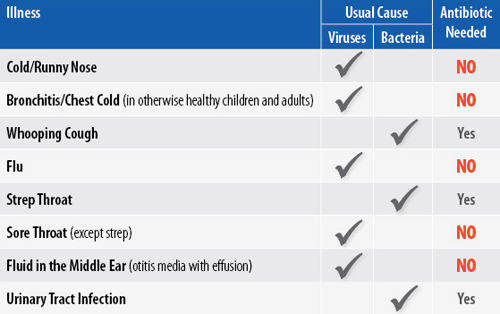The New York State Department of Health wants New Yorkers to think twice before expecting treatment with an antibiotic when they become ill, because an antibiotic is not appropriate treatment for every illness.
“Antibiotics—while powerful agents in fighting bacterial infections—have no effect on viruses,” acting state health commissioner Dr. Howard Zucker said.
In fact, the federal Centers for Disease Control and Prevention and the New York State Department of Health say that overprescribing antibiotics has caused some germs to become resistant to certain medications. At the same time, fewer new antibiotics are being developed to fight these so-called “Superbugs.”
“Get Smart Week” — Nov. 17-23 — is a national coordinated effort of CDC, state and local health departments, and non-profit and for-profit partners. During “Get Smart Week,” the state health department is asking not only patients but also their health care providers to think twice about appropriate treatment for a particular infection.

“Health care practitioners and patients need to work hand-in-hand to fight this problem. Many of the antibiotics currently on the market have become less effective against bacterial infections because they are inappropriately prescribed for viral illnesses. We want to stress again that antibiotics have no effect on viruses,” Zucker said.
In September, President Obama signed an executive order calling for stepped up efforts to combat the rise of antibiotic resistant bacteria, including increased vigilance on the rise of antibiotic resistant bacteria, wiser use of existing antibiotics, and ramped-up efforts to develop a new generation of stronger antibiotics to fight this growing challenge.
Did you know:
- Up to 50 percent of all antibiotics prescribed for patients in the U.S. are not needed or are not optimally prescribed.
- Antibiotics do not treat viral illnesses like colds and sore throat (except strep throat).
- The body will fight the viral illnesses that cause most upper respiratory infections.
- People should only use antibiotics that are prescribed by a healthcare provider; always follow the instructions on the label, properly dispose of leftover medication, and do not share antibiotics with anyone, not even a family member.
- Each time people take antibiotics, they are more likely to carry resistant germs in their noses and throats; common antibiotics cannot kill these resistant germs.
- Good hand hygiene (hand washing) is one of the best ways to keep from getting sick and spreading illnesses.
Appropriate antibiotic use can help protect adults and children.
“We want to see patients, healthcare providers, hospital administrators, and private physicians working together to employ effective strategies for improving appropriate antibiotic use, which will ultimately improve medical care and save lives,” Zucker said.
The survival of local journalism depends on your support.
We are a small family-owned operation. You rely on us to stay informed, and we depend on you to make our work possible. Just a few dollars can help us continue to bring this important service to our community.
Support RiverheadLOCAL today.
































